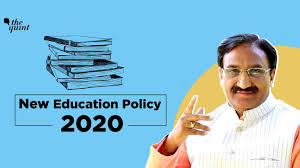National Education Policy 2020 Approved by Cabinet
The Union Cabinet has approved the National Education Policy 2020 that has the objective of ensuring universal education to all levels of students in the schools around the country.
The salient features of the NEP 2020 are:
- It will focus on ensuring universal access to school education at all levels, infrastructure support, innovative education centres to bring back dropouts in the mainstream, tracking students and their learning levels, etc.
- The 10+2 school curricula will be placed by 5+3+3+4 curricular structure corresponding to the ages 3-8, 8-11, 11-14 and 14-18 years respectively. It is going to bring the 3-6 years of age group within the realm of the school curriculum.
- National Curricular and Pedagogical Framework for Early Childhood Care and Education will be developed by the NCERT for children of age up to 8 years. This framework will be delivered through anganwadis and pre-schools with trained teachers and workers.
- National Mission on Foundational Literacy and Numeracy will be set up by the MHRD and the states will prepare an implementation plan for attaining universal foundational literacy and numeracy in all primary schools for all learners by grade 3 by 2025.
- A National Book Promotion Policy will also be formulated.
- The school curricula and pedagogy will aim for the holistic development of learners by equipping them with new-age skills.
- Vocational education will commence from the 6th grade and it will include internships.
- A new and detailed National Curricular Framework for School Education 2020-21 will also be developed by the NCERT.
- The NEP focuses on the delivery of education in the mother tongue and regional language at least till grade 5 but preferably till grade 8 and beyond.
- The assessment criteria have to be changed from summative assessment to regular and formative assessment which will be based on competency.
- A new National Assessment Centre, PARAKH (Performance Assessment, Review and Analysis of Knowledge for Holistic Development) will be set as a standard-setting body for the purpose of assessment.
- In order to ensure equitable and inclusive education, Gender Inclusion Fund and Special Education Zones will be set up in the country.
- Every state/district will also set up Bal Bhavans as a special daytime boarding school to participate in art-related, career-related and play-related activities.
- A National Professional Standards for Teachers will be developed by the NCERT by 2022 so that teacher recruitment can be done based on that and also robust career path can be organized for the teachers.
- An Academic Bank of Credit is to be established for digitally storing academic credits earned from different higher education institutions so that these can be transferred and counted towards the final degree.
- Multidisciplinary Education and Research Universities, at par with IITs, IIMs to be set up as models as best multidisciplinary education of global standards in the country.
- The National Research Foundation will be created as an apex body for fostering a strong research culture and building research capacity across higher education.
- Higher Education Commission of India will be set up as a single overreaching umbrella body for the entire higher education, excluding medical and legal education.
- Open and Distance learning will be expanded to play a significant role in increasing the Gross Enrolment Ratio in the schools whereas a comprehensive set of recommendations have been provided to promote online and digital education in the country.
- An autonomous body, National Educational Technology Forum will be created to provide a platform for the free exchange of ideas on the use of technology in various areas of education.
Month: Current Affairs - July, 2020


